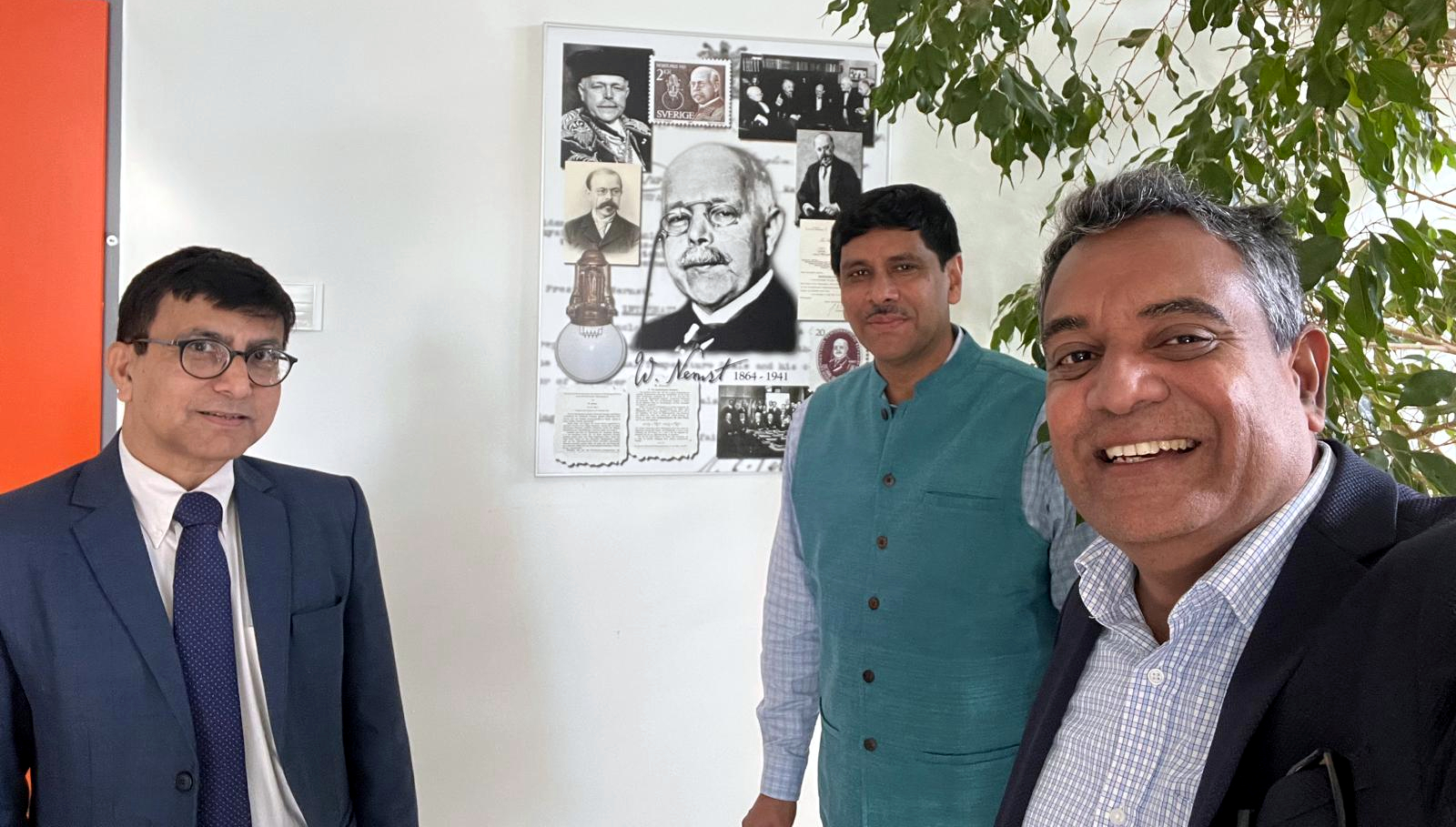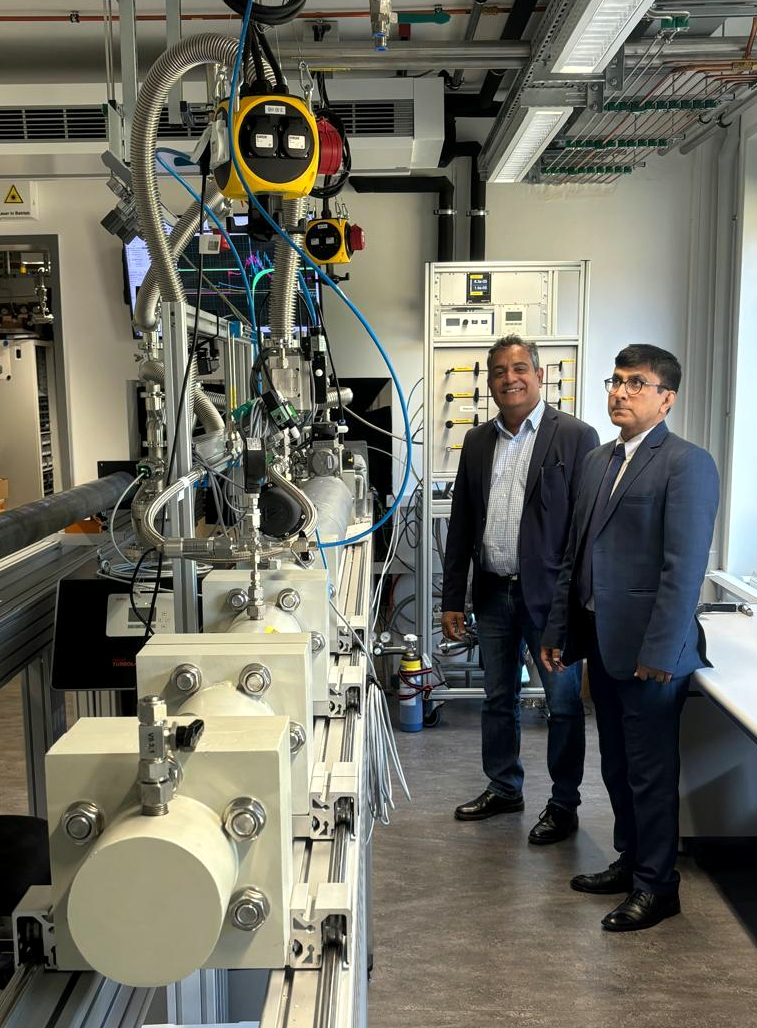German-based researcher Dr Ravi Fernandes serves on the Advisory Board of DIN-FAM, the German Institute of Standards for Fuels Standards and heads the Energy section of the International Measurement Confederation (IMEKO)

Dr Ravi Fernandes, Director & Professor, Head of the Physical Chemistry Department Physikalisch-Technische Bundesanstalt (right) along with visiting professors of BITS Goa during their visit to Germany.
DOHA
When Dr Ravi Fernandes narrowly missed getting admitted to medical school in Goa decades ago, it turned out to be a blessing in disguise for the world of research.
"I missed out on a seat in medical school in Goa, it was devastating at that moment and now looking back, I think it was a blessing," says Dr Ravi Fernandes, now a German-based researcher and Director & Professor, Head of the Physical Chemistry Department at the Physikalisch-Technische Bundesanstalt (PTB) in Germany.
Among his numerous accolades, Dr Fernandes has chaired the Energy Metrology of the International Measurement Confederation (IMEKO) and sits on the Advisory Board of DIN-FAM (German Institute of Standards) for Fuel Standards.
"Through these organisations, I lead efforts to steer standardisation activities for energy carriers, influencing the harmonisation of standards on a global scale," he explains.
Reflecting on his early ambitions, Dr Fernandes acknowledges that, like many Indian parents, his parents envisioned him becoming a doctor or engineer.
"But destiny had other plans for me," he adds.
EARLY EDUCATION
Dr Fernandes attributes much of his success to his humble beginnings in his village school.
"A lot of credit goes to my school, St. Rock's in Tollecanto-Velim, to my teachers, and especially to my mother, who was also a teacher there," he recalls. "At the time, many people aspired to send their children to prestigious schools in Margao, but I had a simple start—and I received a lot of attention from my teachers."
He believes that attending a village school came with its own set of advantages.
"I participated in elocution competitions and debates, which gave me a lot of confidence from a young age. I could walk to school and back, leaving me plenty of free time to play cricket and engage in other activities. Life in the village is, without a doubt, the most beautiful," says Dr Fernandes.
One of the turning points in his academic journey was securing the first-ever distinction for his school in the SSC exams.
"That's when I learned to dream big, and believe that nothing is impossible with hard work and passion."
PASSION FOR RESEARCH
Dr Fernandes continued his education at Chowgule’s College in Margao, where he pursued his higher secondary education in science and earned his BSc in chemistry. After graduating, he briefly considered following a common path among Goan Catholics—becoming a seaman.
"I thought about making quick money as a seafarer, but I knew it wasn't the path I truly wanted to follow. However, due to financial constraints and limited career opportunities in Goa, the idea lingered until I left for Germany," he shares.
Choosing the right career path was challenging for Dr Fernandes, as it is for many Goan students today.
"Career decisions aren't easy for many Goan youth. We tend to aim for quick stability. In other states, students often target IITs, the IAS, or research roles—this is less common among Goan Catholics," he notes.
"Young Goans need inspiration through example, not just theory. Much of that inspiration comes from good teachers and strong leaders."
Dr Fernandes credits his college professors for nurturing his passion for research.
"My decision to pursue an MSc in Physical Chemistry and later research was heavily influenced by inspiring teachers like Dr G.K. Naik, Dr Julio Fernandes and Dr Chandrasekhar Nese, who ignited my love for research. I worked on small projects with them and had my first experience at a research conference in Mangalore. That was probably the turning point that led me to pursue research."
After completing his MSc, Dr Fernandes briefly taught physical chemistry on a contract basis at Quepem College.
MOVING TO GERMANY
Determined to find better research opportunities, Dr Fernandes applied to two institutions in Germany for a PhD position.
"One application was rejected due to my lack of experience, but the University of Karlsruhe (now KIT) accepted me on a mutual agreement," he recalls.

However, this opportunity came with its own set of challenges.
"Unlike IITs, my master’s degree from Goa University wasn’t considered equivalent to the German system. I had to agree to complete additional equivalency courses in chemistry—entirely in German—within six months," he explains.
Failing to pass the exams within this period would mean returning to Goa.
"There was a lot of pressure. I enrolled in intensive German language courses for two months while simultaneously conducting research. I was working nearly 18 hours a day with very little sleep," he recounts.
Despite the difficulties, Dr Fernandes remained focused on his goals.
"I successfully completed the courses within six months, learned basic German, and registered for a funded PhD program under the supervision of Prof. Horst Hippler, who, unfortunately, passed away a few weeks ago," he says.
Dr Fernandes went on to complete his PhD in a record three years—the fastest PhD at the institute at the time.
"I was determined to finish quickly, often working late nights and weekends."
Following his PhD, Dr Fernandes was recommended for a Postdoc position at the renowned Max-Planck Institute (in Göttingen) which has the maximum Nobel Prize Laureates in Europe. After three years, he moved to the Sandia National Laboratories in California, for energy research contracted at that time by Lockheed Martin Corporation under the auspices of the US Department of Energy.
However, Germany soon sought to bring Dr Fernandes back. (To be continued)